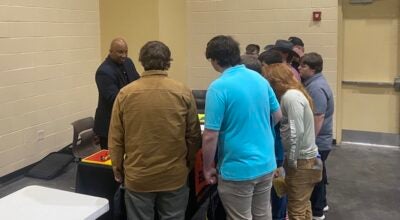Cream, sugar, salvation
Published 9:24 pm Wednesday, February 25, 2009
The Army’s Life Support Area is an ant hive of activity, serving as the transition point for thousands of U.S. service members moving into and out of Iraq and Afghanistan.
Moving through the large tents past desks for travel representatives and service liaisons, it’s possible to miss a little alcove in the thick of it all and yet very much out of the way of the busyness and hustle that surrounds it.
There is no rushing around in here. In a way, it’s not even permitted. Bookshelves line one wall while a comfortable leather couch allows transient service members a place to sit down and relax, and oftentimes the only sound one can hear in this sanctuary from the industriousness outside is the gurgling of the coffee maker on the far wall.
And while a Soldier, Sailor, Airman or Marine waits for the coffee to brew, he might meet one of the sanctuary’s caretakers, the four chaplains and chaplain assistants of the 586th Air Expeditionary Group Gateway Chapel Section.
The LSA has a post chaplain, but these four are not here to provide worship services. With thousands of troops coming through the Gateway every week, Chaplain (Capt.) Dallas Little and his unit act as sensors and counselors, constantly on the look-out for service members in need of help.
“The primary reason we’re here is to do counseling with emergency leave troops,” Chaplain Little explained. “All of the Army folks come through here if they’re going home on emergency leave, so we see a tremendous amount, about a thousand a month, of emergency leaves come through here.”
The time of transition, the point between leaving home and actually arriving at a deployment or the other way around, can be a very stressful time for military members, Chaplain Little said. The chaplain section exists as a sort of safety valve, giving transitioning troops a place to relax, vent and when necessary, seek help. Unfortunately or fortunately, depending on one’s outlook, the chaplain staff is constantly busy.
“In six months we’ve done close to 900 counseling sessions,” Chaplain Little said. “The numbers that go with that are pretty astronomical. We estimate 3,000 to 5,000 people every single day come through the gateway. That means that in the six months of our deployment, we’ve seen right at 220,000 people come through.”
Troops moving through the LSA are only here for a few days to week, but Staff Sgt. Matthew Teets, a chaplain assistant deployed from the 78th Air Base Wing at Robins Air Force Base, Ga., said that short time could mean the difference between life and death.
“A lot of these guys who are coming back will eventually go forward to FOBs where there are no chaplains,” he said. “Not everybody goes to a brick and mortar installation where they have a chapel staff waiting to minister to their needs. So this is not only the first line of defense for spiritual triage, but it’s also the last line of defense.”
Chaplain Little said the staff can’t just limit their scope to those on emergency leave. He said he was surprised to find how many people going or coming from rest and relaxation leave needed their help.
“This is where the surprise came for us,” the Clanton native said. “We expected that when people came back here from their R and R that they may be depressed because they were having to go back into battle, that they would be homesick, etcetera. But what we found was that a lot of people go home and they face very significant marriage and family issues. Some of them roll into some very interesting situations that are waiting for them when they come home, so we do a lot of post R and R counseling for serious problems folks had.”
Unfortunately, there is no way to know just by looking who needs help and who doesn’t. That, Chaplain Little said, is where the coffee comes in.
“Many people who end up talking to us didn’t stumble in here looking for a chaplain,” he said. “They came in here to get a cup of coffee or a snack, and while they’re waiting for the coffee to brew, they find themselves talking to one of our chaplain assistants. That ministry of hospitality is the cornerstone of the chaplain section’s success. Though centrally located “in the stream,” as Chaplain Little put it, with only four people to serve thousands, a hook was needed, a way to give people seeking help an excuse to find themselves near it.
Once the chaplains are asked for help, the next step begins, a long, complicated kabuki dance finding the best way to provide help and getting that troop to it.
“Oftentimes it includes dealing with different agencies,” Chaplain Little said. “If we have someone we truly believe is going to harm themselves or others, then we have to get them in touch with the real-deal mental health professionals, the combat stress team at the Rock.”
Despite the complications, the chaplain team has been successful in getting people the help they need, going through this procedure 10 times in six months. One of the things that has made them successful is their cohesion as a team, remaining true to each other through the wingman concept.
Chaplain Little and his crew were scheduled to rotate out Feb. 18 and will do so, they say, without any doubt that they’ve made a difference. When asked if they think they’ve saved lives, Chaplain Wells replied for the group.
Although the work is stressful and at times heartrending, the members of the chaplain section said they know they’re doing God’s work.
“This is what I feel the chaplain service is all about,” Sgt. Teets said. “To actually get into an environment where a chaplain assistant intervenes and deals with people, screens people. I find that some chaplain assistants who cross train find out they don’t actually like the job because it isn’t what they thought it would be. They thought it would be like this.”
It’s not a typical chaplain posting by any means, an “industrial” model of ministry rather than a “pastoral” one. There is no church, no steeple, just a huge tent with a lot of people, and a small, quiet room where four people and a pot of coffee represent the first and last lines of spiritual defense.






